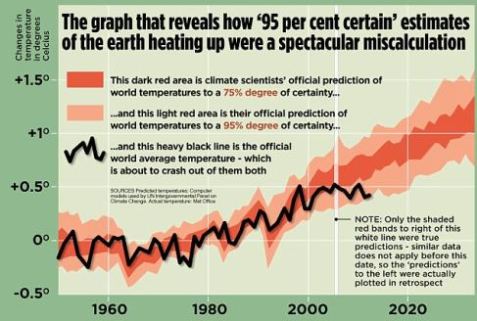Yesterday President Obama announced he is not going to be hindered by lack of congressional action on Global Warming; he’ll use Executive Orders to implement his vision, since Mr. Obama avers that
“We don’t have time for a meeting of the Flat Earth Society.”
The WSJ has a nice editorial on this today, noting that his anti-democratic actions will harm many average Americans through reduced economic activity. Just as the U.S. is on an energy revolution that portends insourcing of manufacturing jobs, Mr. Obama seems intent on raising the costs of fossil fuel energy. The WSJ offers hope to those harmed by Mr. Obama’s policies; they can console themselves with 99 weeks of jobless benefits, food stamps and ObamaCare.
I think its worth thinking about the expansion of powers the President is asserting for himself; we are not a dictatorship–all Americans ought to be concerned when a President asserts that what he cannot get through the democratic process he will do unilaterally. How is that any different morally from Mr. Snowden’s refusal to respect the democratic process on NSA monitoring of phone traffic (all three branches of government involved, with no assertions by Snowden or anyone else that there was actually a violation of the law)? Mr. Snowden didn’t like the result, so he violated his oath to protect classified information and did what was right in his own eyes. Mr. Obama has pledged fealty to the constitution and yet asserts that he can ignore the democratic will. I’ll stop here, since this isn’t my area of expertise, and yet this seems to be a crucial question.
From an economists view, I am a skeptic (or perhaps a flat-earther according to Mr. Obama) for multiple reasons.
- My suspicion starts from the fact that the agenda is pushed by the same people who have always had the same agenda–reduce the scope of freedom in the private sector, and increase the role of government in the economy. Whatever their issue, the answer is always the same.
- The President and others continually trumpet the consensus of scientists on anthropogenic global warming (AGW). I find this less than compelling. The whole global warming industry is set up based on government grants–government is driving the science and since Al Gore, the government is fighting global warming. There is little receptivity toward other points of view–if you want to get ahead in your career, you will–if anything–support AGW. As an academic, I can tell you the supposedly blind peer review can be “managed”; editors know which reviewer is likely to support a paper or not. Getting heterodox opinions in peer-reviewed journals is incredibly difficult.
- As an economist, I continually fight against those that assert the emergent order of a complex system such as the economy can be managed. This is due to the wisdom of Adam Smith, Friedrich Hayek and others of our lack of knowledge–knowledge that cannot be known to all. This is similar to AGW; the complexity of the system dwarfs our ability to understand it such that I question Mr. Obama and Mr. Gore’s continued assertions that the “science is settled.” As Mr. Keynes said in another context, “We simply do not know.” So while the graph above leaves AGW advocates amazed, I find it quite reasonable. Yet their certainty of the reliability of these models forms the basis of the urgency that we must ignore the democratic process to overcome the ignorance of the “flat earthers.”
- Note that my unwillingness to believe their perspective does not mean that AGW is not real, but like a lot of macroeconomics, any attempt at claimed precision with certainty should be met with extreme suspicion.
- Even if true, that AGW is real, its not clear that on net its negative. There will be winners and losers with climate change, and contrary to AGW advocates, CO2 is not a pollutant. Its actually quite helpful to life on earth, especially plant growth.
- Even if AGW is real, and on net the effect is negative, it is in no way clear that proposed restrictions will 1) have any noticeable effect or 2) that the costs will be less than the benefits. What we do know about mankind is a tremendous ability to adapt to changing circumstances. Adaptation is likely far more effective and efficient, even if the AGW supporters are correct.
What do you think?

 Bert Wheeler
Bert Wheeler
 Jeff Haymond
Jeff Haymond
 Marc Clauson
Marc Clauson
 Mark Caleb Smith
Mark Caleb Smith
 Tom Mach
Tom Mach